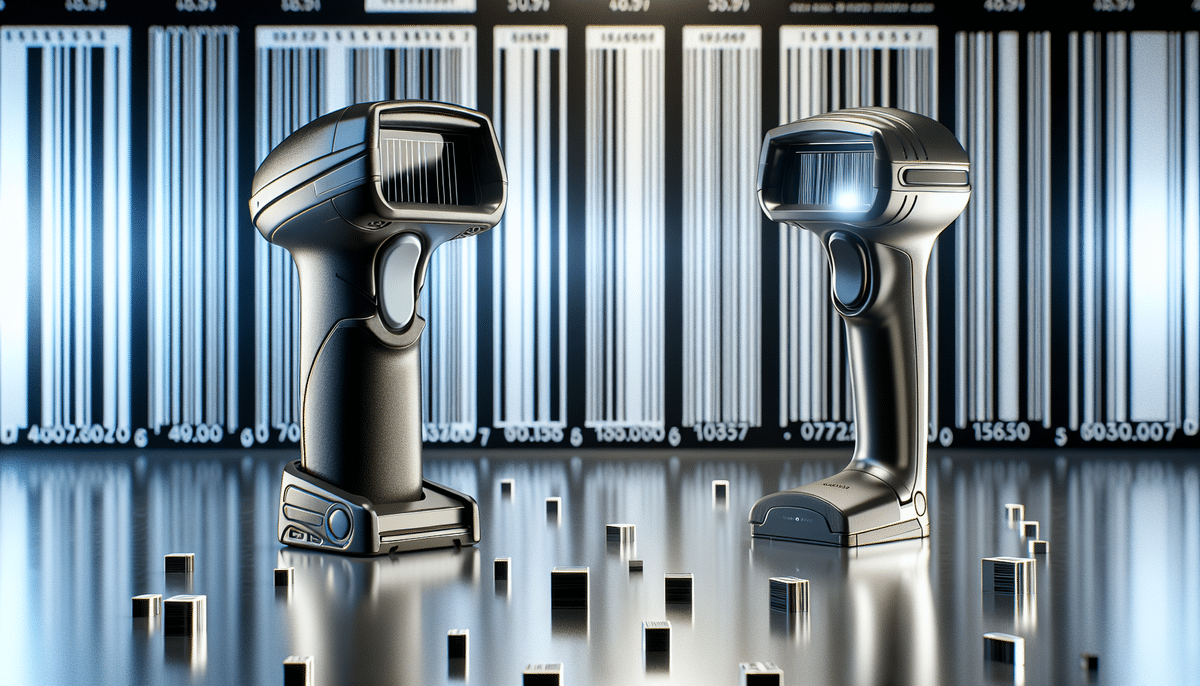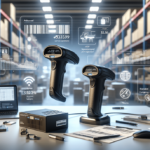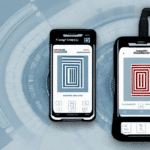Introduction to Barcode Scanners: Honeywell Xenon 1900g vs Zebra DS2208
When selecting a barcode scanner for your business, it's crucial to choose a device that balances speed, accuracy, and durability. Two top contenders in the market are the Honeywell Xenon 1900g and the Zebra DS2208. Both are highly regarded for their performance, but they cater to different business needs. This guide provides an in-depth comparison to help you determine which scanner best suits your requirements.
Design and Durability
Honeywell Xenon 1900g
The Honeywell Xenon 1900g features a robust design, making it ideal for harsh environments. It is larger and heavier, which contributes to its durability. The scanner is built to withstand drops from heights of up to 1.8 meters (approximately 6 feet), ensuring longevity in industrial settings.
Zebra DS2208
In contrast, the Zebra DS2208 boasts a compact and lightweight design, enhancing portability and ease of use in dynamic environments like retail stores. Its patented single circuit board design enhances reliability by reducing the number of components that can fail.
Functionality and Performance
Scanning Capabilities
- Honeywell Xenon 1900g: Equipped with a high-resolution sensor that can read both 1D and 2D barcodes from up to 33 cm away. It excels in reading damaged or poorly printed barcodes.
- Zebra DS2208: Also capable of reading 1D and 2D barcodes, with a slightly longer read range of 36 cm. Additionally, it offers an optional swipe mode for capturing data from mobile device screens.
Speed and Accuracy
Both scanners offer impressive speed and accuracy. The Honeywell Xenon 1900g scans at up to 240 inches per second with a read range of up to 20 inches, making it suitable for scanning large or distant barcodes. The Zebra DS2208, scanning at up to 10 inches per second with a 24-inch read range, is optimized for high-volume tasks in tight spaces.
Ease of Use
Both models feature ergonomic designs with easy-to-press trigger buttons and multiple feedback options (visual, audible, and haptic). The Honeywell Xenon 1900g offers a user-friendly interface, while the Zebra DS2208 includes a touch screen option for enhanced user interaction.
Compatibility and Integration
Compatibility with various systems is essential for seamless integration into your existing infrastructure.
- Honeywell Xenon 1900g: Supports USB, Bluetooth, and RS-232 connectivity, making it versatile for different applications. It is compatible with Windows, Mac, Linux, iOS, and Android devices, and integrates well with warehouse management and point-of-sale systems.
- Zebra DS2208: Offers USB and Bluetooth connectivity, but lacks RS-232. It is compatible with Windows, Mac, and Linux but does not support iOS and Android devices as extensively as the Honeywell model. It is particularly well-suited for retail and hospitality applications.
Pricing and Value
Price is a significant factor, and both scanners differ in cost and value proposition.
- Honeywell Xenon 1900g: Generally more expensive upfront due to its advanced features and durability. However, its longer lifespan and lower maintenance needs can result in cost savings over time.
- Zebra DS2208: More affordable initially, making it attractive for businesses with tighter budgets. While it may require more frequent maintenance, its lower price point still offers excellent value for high-volume scanning in less demanding environments.
Pros and Cons
Honeywell Xenon 1900g
- Pros:
- Rugged design suitable for harsh environments
- Reads damaged or poorly printed barcodes
- Wide compatibility with various devices and systems
- Cons:
- Higher initial cost
- Heavier and bulkier design
Zebra DS2208
- Pros:
- Compact and lightweight
- Optional swipe mode for mobile devices
- Lower upfront cost
- Cons:
- Less durable for extreme environments
- Limited compatibility with mobile operating systems
Choosing the Right Scanner for Your Business
To select the appropriate barcode scanner, consider the following factors:
- Environment: Industrial settings may benefit more from the rugged Honeywell Xenon 1900g, while retail environments may prefer the Zebra DS2208's compact design.
- Barcode Types: If you frequently encounter damaged barcodes, the Honeywell model offers better performance.
- Budget: Evaluate your budget, including long-term maintenance costs.
- System Compatibility: Ensure the scanner integrates seamlessly with your current software and hardware systems.
Real-Life Applications
Different industries leverage these scanners based on their specific needs:
- Healthcare: Hospitals use the Honeywell Xenon 1900g for reliable patient information scanning.
- Retail: The Zebra DS2208 is favored in retail for quick checkout processes and handling high volumes.
- Manufacturing and Logistics: Both scanners are utilized, but the Honeywell Xenon 1900g is preferred in more demanding environments due to its durability.
Customer Feedback
Users consistently praise both scanners for their reliability and performance. The Honeywell Xenon 1900g is lauded for its durability and ability to handle challenging barcodes, making it a favorite in industrial settings. Conversely, the Zebra DS2208 receives accolades for its ease of use and affordability, which are crucial in fast-paced retail environments. Some users note that the Honeywell model's weight can be a drawback for extended use, while the Zebra scanner may not withstand extreme conditions as well as the Honeywell.
Conclusion: Which Scanner Should You Choose?
Ultimately, the decision between the Honeywell Xenon 1900g and the Zebra DS2208 hinges on your business's specific needs. If durability and the ability to read compromised barcodes are paramount, the Honeywell Xenon 1900g is the superior choice. However, if you require a cost-effective, lightweight scanner for high-volume retail operations, the Zebra DS2208 stands out. Both scanners offer robust performance, ensuring that whichever you choose will enhance your business's efficiency and accuracy.




















